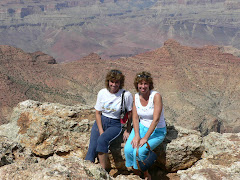
 I received a good inspiring message from another PAP yesterday and started thinking about things that she had written. When most of us started this so called race it was more like a fast walk, but as time has progressed our fast walk has become more like an endurance race instead. All a sudden there are many obstacles in our way. Steep hills to climbs--some steeper than others. Sometimes it feels like you want to give up. I've never run a race before but I just know just from running a short distance I have a hard time just doing that. So how do you handle a endurance race? We didn't get good news that we expected from Kyrgyzstan. Things seem to still be getting "organized" right now.
I received a good inspiring message from another PAP yesterday and started thinking about things that she had written. When most of us started this so called race it was more like a fast walk, but as time has progressed our fast walk has become more like an endurance race instead. All a sudden there are many obstacles in our way. Steep hills to climbs--some steeper than others. Sometimes it feels like you want to give up. I've never run a race before but I just know just from running a short distance I have a hard time just doing that. So how do you handle a endurance race? We didn't get good news that we expected from Kyrgyzstan. Things seem to still be getting "organized" right now.
I found something while searching today on the race God has before us and wanted to share this with you.
Running the Race with Endurance
“Run with endurance the race that God has set before you”.
God has a race for you to run! What a challenging and exciting thought—God has given me a race to run. God has designed a purpose for my life—a purpose that I can discover and fulfill. What is this race?
This race begins, not when you are born, but when you receive Christ and his gift of complete forgiveness. The race for me began 37 years ago when I asked Christ to f orgive me and come into my life and lead me. That decision was the end of my lostness—but it was also the starting gun of the race God set before me, and I’m still running that race!
The race is playing the unique role God gives you to influence others for Christ. Paul describes his race in this way in Col.1:28,29 (read; he uses the verb form of the noun translated “race” – agonizomai). My race has revolved around teaching the Bible here and elsewhere. Your race will be different than mine—but it will always revolve around showing and sharing Christ’s love both to people who don’t know him and people who do.
This race requires endurance for two reasons:
It is a marathon—not a sprint. It begins the moment you receive Christ, and it lasts until you die or Christ returns. As an amateur long distance runner myself, I know that the key is not how fast you start the race, but how consistently you run.
It is a steeple-chase marathon—it is filled with obstacles, including opposition from people who aren’t in the race and don’t want you to be in the race, from a cultural value-system that says to live for self instead of for Christ, and from demonic spirits that hate Christ and want to take you out of the race.
The fact that the author calls on us to run this race with endurance means that there is a danger that we will drop out of the race. All who receive Christ automatically go to heaven—but not all who receive Christ automatically finish their race. I’ve seen many start well but end poorly—including many who were key influences in my own life. It’s a very sobering thing, and it makes me want to be able to say with Paul (read 2Tim. 4:8).
How can we do this? What will help us have the endurance we need? The author gives us four keys—we’ll look at the first two keys this week, and the last two keys next week...
Key #1: Get rid of all suitcases
Last year, when I ran the Columbus Half-Marathon, I saw some bizarre behavior at the starting line. It was cold, and most runners had on extra shirts or even old jackets as they waited to start. But in the last 30 seconds, thousands of runners (including myself) stripped off every shirt but the one with their race number—and threw them on to the street. Everyone got as light as possible—because it’s a long race and you don’t want to carry any more weight than you have to carry! One thing I did not see—I did not see anyone picking up suitcases!
Read 12:1 middle. That’s the author’s point, isn’t it? You can’t finish this race with endurance if20you’re carrying extra weight! If you want to run this race, you need to get rid of all suitcases! Notice that the text speaks of two different kinds of suitcases:
The most common suitcase is “the sin that so easily hinders our progress.” This doesn’t mean that you can’t run the race if you commit sins (we’d all be out of the race!)—it means that you can’t stay in the race long if you are clutching on to and rationalizing things that you know God says are wrong and destructive. When you’re clutching on to and rationalizing sexual immorality or substance abuse/dependence, it will sap your motivation and stamina. When you clutch on to and rationalize bitterness and hatred, it will sap your motivation and stamina (Eph.4:32 context). When you’re clutching on to and rationalizing things like materialistic greed, it will sap your motivation and stamina (Mk.4:18,19).
By distinguishing “the sin that so easily hinders our progress” from “every weight that slows you down,” the author implies that even things that are not overtly morally wrong can be suitcases that we need to lay aside—because they simply don’t fit into the course/race God has set before us. Early in my Christian life, I devoted a lot of time to creative writing. But at a certain point, God showed me that he wanted me to use most of my (very limited) creative talent to de velop Bible teachings. I couldn’t do both to the extent that I wanted to, so I decided to drop most of the writing. And I haven’t regretted that decision. I was talking to a young brother recently who has decided that he needs to radically down-size his living situation so he can have more time and energy to devote to spiritual growth and service. It wasn’t a black and white moral issue—but God showed him that it was a weight that was slowing him down. Other such suitcases include: VIDEO GAMES; INTERNET SURFING; SHOPPING; SPORTS HOBBIES; TV/CABLE. Paul says these things may be lawful, but when they are enslaving you it’s time to put them down (1Cor.6:12).
How about you? Are you carrying any suitcases? Has God shown you that you’re clutching on to some sin that is hindering your progress? Has he pointed out a weight that is slowing you down? Have you been complaining to yourself that living for Christ is exhausting—when the real problem is that you’re carrying suitcases? Get rid of them! Agree with God—call a suitcase a suitcase, instead of arguing that it’s an energy drink. Give it to him and ask him to free you from it—and cooperate with any steps he calls on you to take to be free. It sure helps to have some Christian friends in your life in this area—to help one another identify the suitcases, to pray with one another to agree with Go d on this issue, and to help one another keep the suitcases on the asphalt instead of back into your hands!
Key #2: Get strength from other veteran runners
Read 12:1a. The image here is the stadium at the end of the marathon—filled with thousands of people who are cheering on the runners. Anyone who has run a marathon (or even half-marathon) knows how much it helps to have people on the sidewalk cheering you on. But these are a special group of fans—veteran “runners.” They are “witnesses to the life of faith”—specifically, the Old Testament “runners” that the author highlighted in chapter 11.1 The point is that if you want to run this race with endurance, you need to get strength from other veteran runners. They can give you insight, motivation, and encouragement to keep going when you want to quit. And you have access to thousands of them!
You can get strength from Old Testament and New Testament figures. This is a unique source of strength—the inspired record of how God worked through specific people to advance his plan to rescue a lost humanity. This is one reason to get into a daily Bible reading plan (explain CARSON, For the Love of God)—you will meet and learn a lot from these “runners” who have already finished well.
The Old Testament figures, like those recorded in chapter 11, will teach you a lot about how to run the race. One of the most encouraging things you’ll learn is that they were not super-heroes—they were normal people like you and me, who had weaknesses, character flaws, made mistakes, etc. Noah built the ark—but he also got drunk after the flood. Abraham followed God into a land he’d never visited—but he also chickened out twice about Sarah being his wife. Moses forsook the power and prestige of Pharaoh’s court and stood against his world’s super-power—but he also whined and complained and mistreated God’s people. David was a man after God’s heart who in many ways foreshadowed the Messiah—but he also fell terribly through his adulterous affair with Bathsheba. The point is that God is able to work powerfully through very flawed people—if only the trajectory of our lives is to trust him and follow his directions.
With New Testament figures, like Peter and John and Paul, you can read about what they did in Acts, and then peer into their hearts through their letters.
You can also learn a lot about mistakes to avoid by reading about Old Testament negative examples (cf. 1 Cor.10:6,11)—people who dropped out of the race, didn’t finish well. We’ll learn from one of those Old Testament negative examples (Esau) in two weeks...
You 2 can also get strength from reading biographies of other Christian workers—Christ-followers over the last 2000 years. You will learn about ordinary people like you and me who lived extraordinary lives for Christ. Here are some of my favorites: Against the Tide; Great Souls; From Jerusalem to Irian Jaya. You will be encouraged to see that these people had weaknesses and fears and all kinds of problems—yet God worked through powerfully to advance his plan because they stayed in the race.
You can also get strength from workers God has placed in your life. When you get in the race, God sovereignly brings people into your proximity who can help you learn how to run your race more effectively. They also are a unique source of strength because of the tacit knowledge about following Christ you can get from them.
I don’t know where I would be today without the veteran “runners” God put in my life early in my Christian life. They inspired me by their example to sell out to God’s race instead of living for myself. They gave me insight into the specific race God has placed before me. They challenged me to drop the suitcases I was carrying. They were there to urge me to keep going when I realized how difficult the race could be.
Today, I am one of the veteran “runners”—and a big part of my “race” is giving strength to other younger “runners.” But I still have a precious network of veteran “runners” that I lean on for advice, encouragement, correction, etc. I can’t imagine being in this race without them.
What about you? Are you flagging because you’re trying to run the race by yourself? Get strength from these other veteran “runners!” This is one of the best things about home groups—you get to be around other “runners” who have already run through the part of the course you’re presently in. You get to rub shoulders with people who have endurance, and who can teach you how to get it. You get to learn from them how to study the Bible’s “runners” and get strength from them. Don’t neglect this precious resources! Get involved, seek them out, ask them to mentor you, etc.
I have fought the good fight, I have finished the race, I have kept the faith 2 Timothy 4:7
Do you not know that in a race all the runners run, but only one receives the prize? So run that you may obtain it.























No comments:
Post a Comment